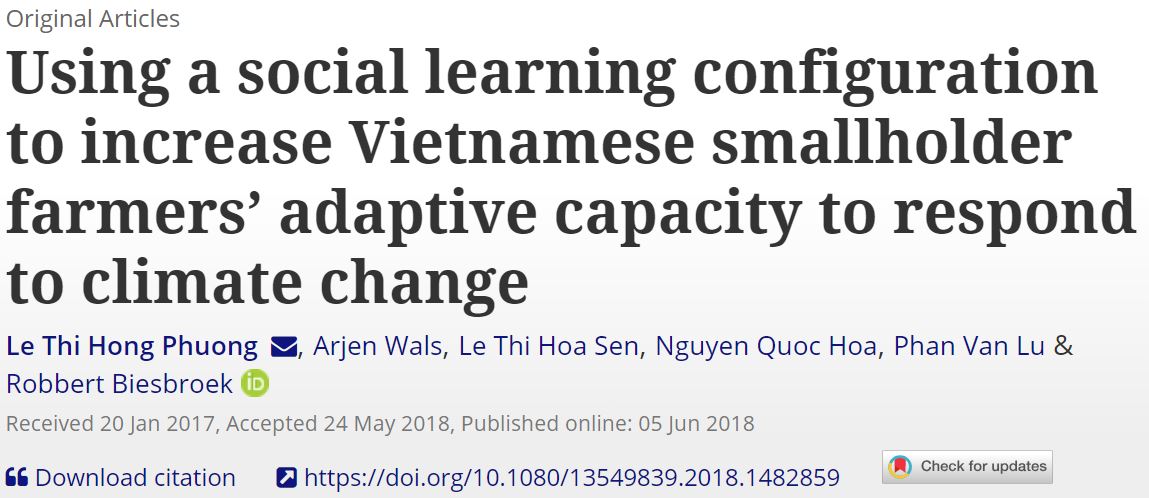
Cornell University’s Civic Ecology Lab is starting a new online course on Climate Action during a time where the topic is more urgent then ever but also, when many people, the forunate ones, are locked-down into there home environment with access to technology and lots of time on their hands. Here is the basic info. You can also go straight to their website!
Overview. Many of us want to do something about climate change, but individual actions can feel inadequate in the face of the looming crisis. In the Network Climate Action: Scaling up your Impact online course, you will learn what the latest research says about how to scale up your individual actions through your social networks. You will choose a greenhouse gas mitigation action you take yourself and apply social influence research to persuade your family, friends, social media followers, or other social network to also take that action. You will be part of a unique online community that is applying innovative, exciting, and evidence-based approaches to fight climate change!
Participants. Environment, climate, and education professionals, volunteers, university students, or other climate concerned citizen from any country. Discussions will be in English. This is NOT a course about climate science, but rather about how you can take effective action to help address the climate crisis.
Cost. $60 fee. Most participants pay this fee.
Options available to pay a higher fee ($120) to sponsor another student, or pay a lower or no fee if you are unable to pay or live in countries without internationally accepted payment systems (e.g., Afghanistan, Iran).
Educational approach. The course is based on two principles: (1) Learning is social: participants learn by discussing ideas and sharing resources; (2) Learning should lead to action: participants will apply course content to implementing a climate action of their choice and by persuading one of their social networks to take that action alongside them.
Technology. Edge edX for readings, pre-recorded lectures, and discussion questions (asynchronous). We will also use Facebook and WhatsApp for optional informal discussions and sharing. We will host one webinar each week (Thursdays 8am NY time) and one “office hours” webinar for participants to ask questions each week (Wednesdays 8am NY time). Webinars will be recorded if participants are unable to attend in person.
Certificates. Participants who complete the course are awarded a Cornell University certificate (PDF). Weekly assignments include lectures, readings, and discussion questions. Participants are required to participate in a minimum of one course webinar in person or by watching the recorded webinar. Required course project is a one-page report on the climate action you took with your network.
Learning outcomes. Participants will:
-
Describe the feasibility and effectiveness of actions to mitigate greenhouse gases across different countries and contexts.
-
Implement an action to reduce greenhouse gases themselves and among their social network.
-
Critically reflect on the results of their network climate action and write a one-page report of their action and reflections.
-
Participate actively in a global online community of climate-concerned citizens.
Topics. Topics. Week 1: Climate Solutions to reduce greenhouse gas emissions from www.drawdown.org. Week 2: Social Networks and spread of climate behaviors; Week 3: Social Mobilization; Week 4: Social Norms; Week 5: Social Marketing and Social Media.
Work load. 5 weeks (4-5 hours of work per week). Throughout the course, you will be working on your network climate action. During the last week, you will complete and submit a final report on your project to persuade one of your social networks to take a climate action.
Dates. April 7 – May 12, 2020. Assignments must be completed no later than May 19, 2020.
Instructors. An experienced and dynamic team from Cornell University Civic Ecology Lab: Marianne Krasny (Professor), Alex Kudryavtsev (Research Associate), Yue Li (Research Associate), Kim Snyder (Course Administrator), Melanie Quinones Santiago (Spanish language assistant), Wanying Wu (Chinese language assistant), plus 10 Chinese language teaching assistants.
Webinar Schedule. We provide two weekly webinars. You can watch them live or the recorded version.
Wednesdays, 8am NY time, “Office Hours” question/answer with instructor Marianne Krasny
8, 15, 22, and 29 April, 6 May
Thursdays, 8am NY time, Plant-rich Diet: Persuading family and friends (This webinar series also open to the public
26 March: Where’s the beet? How diet is a climate game changer; Jennifer Wilkins, Syracuse University
2 April: Harnessing Peer Pressure to Parry the Climate Threat; Robert H Frank, Cornell University
9 April: Menus of Change: Bringing the principles of health and wellness to life; Brendan Walsh,
Culinary Institute of America
16 April: Sustainable Diets and the EAT Lancet Report; Elizabeth Fox, Cornell University
23 April: Cornell Dining: Menus of Change principles reflected in our culinary program;
Lisa Zehr and Michelle Nardi, Cornell University
30 April: How Climate Behaviors Spread in Networks; Damon Centola, University of Pennsylvania
7 May: “Sustainable Tapas” Project: Complex behaviors and social mobilization approaches to climate action;
Fátima Delgado, Universitat Politècnica de Catalunya






